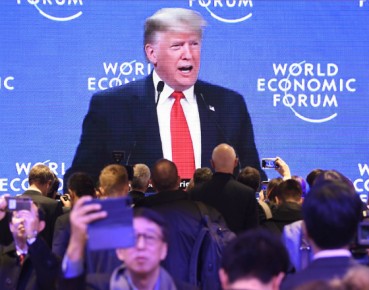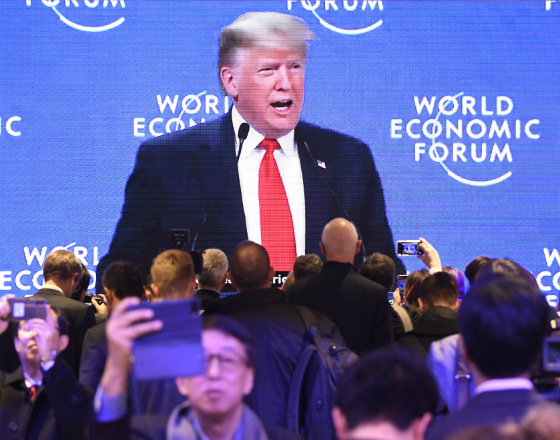
(©World Economic Forum, CC BY-NC-SA)
The IMF reduced its global economic growth forecast for 2020 from 3.4 per cent (as projected in October 2019) to 3.3 per cent and cut its forecast for the next year from 3.6 to 3.4 per cent. These figures are slightly higher than the 2.9 per cent growth achieved in 2019 when the global GDP growth was at its lowest since the last financial crisis.
Earlier hopes for improvement of economic growth this year resulted from the expected increased recovery in large emerging economies such as: Brazil, India, Mexico, Russia and Turkey. However, according to the IMF, GDP growth in these countries is likely to return to historically average levels and the downward revision has been most strongly affected by cutting India’s economic growth forecasts. It was also indicated that although there were signs of stabilization in trade relations between the US and China — after the completion of the first phase of the trade agreement — the economic growth risk resulting, among others, from trade uncertainty still remains. Moreover, as indicated by the IMF chief economist, Gita Gopinath, the sustainable global economic recovery will be possible owing to closer multilateral cooperation.
In this context, particular attention should be paid to the statement of the Chinese Deputy Prime Minister, Han Zhenga, who stressed in Davos that the economic globalization is a historical trend and the natural result of progress in science and technology, and that in a deeply integrated world no country can manage on its own. For this reason, he believes that it is important to promote the growth of the global economy and create mechanisms to better share the benefits of globalization.
Trump does not believe the pessimists
The speech by the US President Donald Trump was particularly awaited. He focused mainly on presenting the achievements of his presidency and pointed to the positive features of the American economy. Moreover, Mr. Trump was toning down concerns related to climate risks and the projected economic slowdown. He pointed out that “economic pessimists” and, in particular, “environmental pessimists” who anticipate the negative effects of climate change should be rejected.
In that way he referred to an earlier presentation by the young pro-environmental activist, Greta Thunberg, who took the opportunity to speak at the Forum to alarm that governments and business leaders do not do enough to avoid irreversible climate changes. According to some researchers, climate changes may occur faster than previously predicted — for example the San Francisco Federal Reserve economists say that there is a 60 per cent probability that the Arctic Ocean will be completely ice-free as early as in the 2030s.
The only positive result of Greta Thunberg’s efforts to date — as she herself indicates — is the massive mobilization of young people around the world that has contributed to enhancing the awareness of climate change among the whole population.
Enterprises are also responsible for the environment
In the panel Solving the Green Growth Equation attempts have been undertaken to find a golden mean that will enable economic growth while limiting its negative impact on the environment. It refers particularly to enterprises facing the challenge of reducing or eliminating greenhouse gas emissions, while maintaining the profitability. Interestingly, even Andrew N. Liveris, member of the management board of Saudi Aramco, stated that “the days of fossil fuel — the fuel of the 20th century — are numbered”.
In addition, investors now expect companies to provide information on key performance indicators related to climate change, stressed Mark Carney, the Governor of the Bank of England, who will soon assume the role of the UN Special Envoy for Climate Action and Finance. Mr. Carney has also said that new accounting standards for enterprises are under preparation, taking into account their impact on climate. They are to be presented at the UN Climate Summit COP26 to be held in Glasgow in November.
Technological Arms Race
Another important subject discussed during the first day of the Forum was technological arms race, in particular between the US and China. Both countries invest substantial funds in Artificial Intelligence and other digital technologies that are changing the future.
One of the participants of the panel, historian and a philosopher Yuval Noah Harari, pointed out that it could be a repetition of the 19th century industrial revolution when leaders had a chance to dominate the world politically and economically — with the difference that nowadays it can only take place on the basis of the data available. Taking this into account, he summarized the characteristics of the two world’s greatest powers: according to him, there is now a system of state surveillance in China and surveillance capitalism in the United States.
Biotechnology vs. evolution
Another panel focused on the influence of humans on the evolution of species When Humankind Overrides Evolution. Ethical issues related to synthetic biology were discussed. This branch of science applies engineering principles to biology in a way that may enable extinct species to be recovered to life or pests to be permanently eradicated in the near future and, in simple terms, is the continuation of the trend of human control of the nature that began with animal breeding programs.
Possible applications of new biotechnology include, for example, the development of new antibodies to avoid pandemic diseases or to cure chronic genetic diseases. The key issue today is to maintain transparency of these innovative and sometimes controversial scientific developments.


